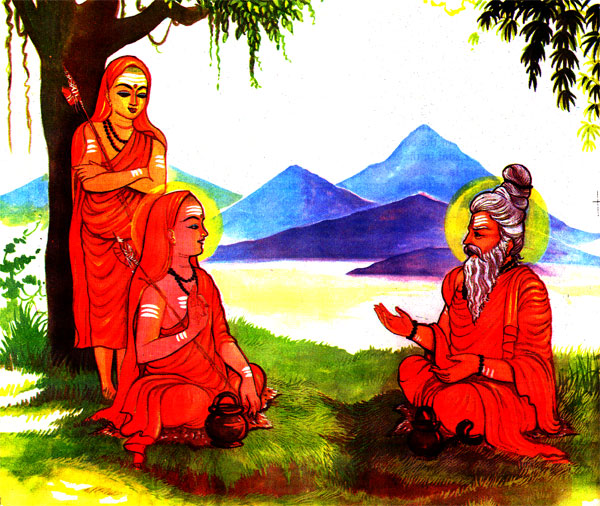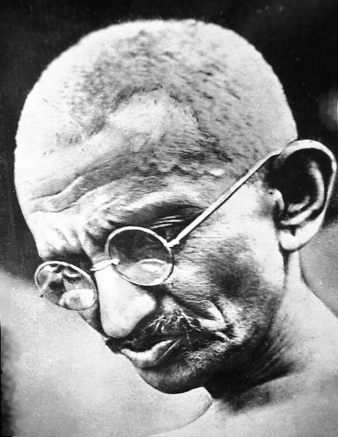
Disagreement and debate have long been central to the Hindu tradition. Here is a mythological debate between Adi Shankara and Vyasa. Image source: Ramakrishna Mission
“The cure for pride is knowledge. Who can cure
A man who’s proud of knowledge?
If the patient should be allergic to amrita,
The prognosis
Is hopeless.”
-Shudraka[1]
Those who have read this website since its inception know that it forwards a heterodox perspective on Hinduism. I empathize with Duryodhana and Karna in the Mahabharata, and find Arjuna’s despondency to be justified. I’m deeply interested in naastik sects, and I’m critical of the conception of female morality, which has been derived from characters like Sita or Draupadi. This is the critique of a highly skeptical student of the Hindu philosophical tradition, not the kneejerk response of a blindly reverent follower.
Furthermore, I don’t wholly dismiss the work of the scholars I’m about to criticize. I’ve enjoyed her books immensely, and strongly respect the her work, including her work on eroticism, gender, and sexuality. I’ve cited some of their work in the past, and will continue to do so. Western scholars viewing Hinduism from the outside provide a useful perspective. To quote Wendy Doniger’s introduction to her and Brian Smith’s translation of The Laws of Manu:
“Of course, both native commentators and Orientalists have axes to grind, but they are different sorts of axes. The axe of the native commentator is honed on a more intense and immediate personal involvement in the text, which may give him good reasons to want to misread the text, to fudge or misinterpret the verse in order to make it mean what he thinks it ought to mean. The axe of the Orientalist, on the other hand is sharpened by cultural ignorance and lack of empathy, or a distancing from the culture, which may lead to misinterpretations of a very different sort.”[2]
Doniger isn’t a fool. She understands that she and her colleagues are coming from outside the tradition they study, and that this will necessarily introduce certain biases into their scholarship.
Knowing that she acknowledges her bias, at least in theory, lets proceed to the criticism:
The Short Version:
The main problem, which many Hindus have with her work, and the work of her students, lies in their Freudian approach. Critics from within and outside of Hinduism posit that this methodology is not intellectually rigorous, and often is used to formulate bizarre and (to a believer) denigrating portrayals of the religion based on untested psychological speculation. Defenders of the Freudian approach are quick to point out that though Freudian theories have gone out of style in clinical and research psychology, it is still very much in vogue in philosophy, literary criticism, and religious studies. This is a fair point, but simply being widespread doesn’t make the Freudian lens more tenable in this author’s opinion.
More damningly, the scholars under critique have committed a number of factual inaccuracies and translation errors throughout their work. Worst of all, since these scholars predominate in the field (critics sometimes use the word “cartel”) the peer review process is relatively ineffective in ensuring that their errors don’t make it into journals and published books. This isn’t necessarily a criticism of the scholars in question, but is a natural product of in-group bias. As a result, such works are praised, awarded, and often become bestsellers. These portrayals, which are of a decidedly outsider’s perspective form the basis of Hinduism as portrayed in encyclopedias, textbooks, and museums.
However, the response of Doniger and her Freudian colleagues to their critics is what truly raises the moralistic ire of the diasporic Hindu community. When critics such as Rajiv Malhotra (who normally poses unnecessarily aggressive critiques, but in this particular instance his polemic pointed to specific arguments and facts), Swami Tyagananda, S.N. Balagangadhara, or those at the Hindu American Foundation or the number of other Hindu groups point out their denigrating portrayals and inaccuracies, these critics are not treated as “insiders” giving a critique which might be biased in the opposite direction, but which nevertheless deserves consideration and response. They are instead accused of religious radicalism, bigotry, and a proclivity towards violence. It is true that there are Hindu groups and individuals which are guilty of these things, and much of the loudest and most rhetorically effective criticism of Doniger and the Freudians have been from this camp (The funny thing is that while Doniger is normally the centerpiece of this controversy, her writing is mild compared to that of her colleagues.) It is a disaster for free speech that her recent book was pulled from the Indian market at their behest, and their participation in the 2009 California textbook case pushed moderate Hindu voices into the background. But this does not justify conflating criticisms of erroneous content, with criticisms of a more emotional character, nor does it justify tarring their opponents as quasi-terroristic or Hindutva radicals. By this conflation, substantive Hindu critiques aren’t even recognized as legitimate much less addressed.
Let me substantiate this narrative:
Continue reading →





